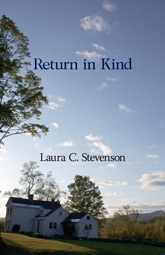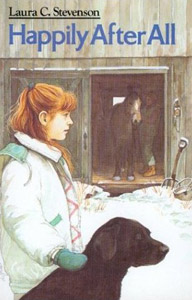A New Series: One Minute Reviews of
Books by Vermont Authors
Laura's column "One Minute Reviews" has appeared bi-weekly in Wilmington, Vermont's Deerfield Valley News since 2015. In April 2018, she found that no Vermont periodical consistently reviews all commercially published fiction and non-fiction by Vermont authors, so she started a series to fill that void. Published reviews from that series and some earlier reviews of local authors are listed with links to a scan of the printed copy. Reviews still in queue are listed without links until they appear in print.
The books reviewed in this series are available through Wilmington's Pettee Memorial Library, the Whitingham Free Public Library, and locally owned Bartleby's Books in Wilmington.
Deerfield Valley News, 11/15/2018
Metaphor of Emotions in 13 Short Stories
T. Stores, Frost Heaves. Green Writers Press, 2018
The title story in these thirteen intricately linked short stories is the last, but the metaphor of emotions that push themselves up from beneath the thick surface of ordinary lives deftly describes the whole. The collection portrays episodic moments in the lives of the residents of Neweden, an imaginary Vermont village close to Brattleboro. The stories are arranged chronologically over the course of a year, the passage of time marked by four portraits of village gatherings: Town Meeting Day, a summer solstice bonfire, a harvest celebration, a Christmas carol sing. In these transitional stories, the point of view changes swiftly as Stores's literary camera quickly pans the scene from various points of view. The nine other stories are individual portraits, each unfolding the past that lies beneath present joys and sorrows. Neweden, thus portrayed, is hardly the rural paradise its name implies; it's a twenty-first century community of people old and young, commuter and local, gay and straight, comfortably off and struggling, most of whom have known each other and each other's children for years, who support each other in times of loss—but who are, in the final analysis, unable to touch the hidden upheavals in their neighbors' private lives. While each story stands on its own, a reader who reads them in order gains the pleasure of seeing characters round out as they appear in different places. For example, at the Town Meeting that opens the book, we briefly meet selectman Paul Dean, who has recently left his wife and come out as gay; his only regret is that he has been totally rejected by his college-age son, Jared. At the summer solstice party, we see a brief shot of Jared, who is still furious—especially since Paul has brought his lover to the party. The two vignettes strengthen the full-length portrait of Jared in "Indian Love Call," as he moves from adolescent fury at his parents' public "unbinding ceremony" to performing a symbolic action that asserts the importance of his family's history in their future. Similarly, Mari and Chris, a lesbian couple excited by Mari's pregnancy with twins, appear briefly at Town Meeting, and again as hostesses of the solstice bonfire, thus deepening the portrait of Mari in "Love Theory 7," in which her anxiety about the developing addition to their house parallels her worries about giving birth and mingling motherhood with her artistic career. The vignette of Mari and her wife at the Christmas sing to which they each carry a month-old twin assures us that all went well. But not all stories in Neweden end well. At the sing, we see the kindly community supporting Vicky Wells, who has lost the child she was expecting at the Town Meeting, only to have the baby born deformed and hospitalized through the anguished summer described from the point of view of Vicky's husband in "Fisher." The landscape of Neweden is inhabited not only by humans, but by other creatures who are also characters in the stories. Town Meeting is interrupted by the indignant skunk who had spent in the basement of Union Hall. In "Big Night," Sharon and Henry get together helping salamanders cross the road to a vernal pool in the first warm rain of spring. Summer solstice brings out a bear and her cubs, waiting for the garbage; "Just So," set in Rudyard Kipling's Naulakha, turns on the capture of a mouse and the death of a cat. "Harvest" is seen from the point of view of a seven year old buck, so silent that nobody has ever been able to shoot it. And some of the people at the Christmas scene see—or sense—the presence of the catamount that watches them with alert indifference. Like the interwoven stories, the interweaving of animals and humans adds yet another perspective to the Vermont lives that this superb, compassionate and exquisitely written collection portrays.


